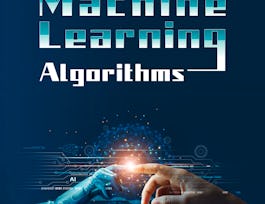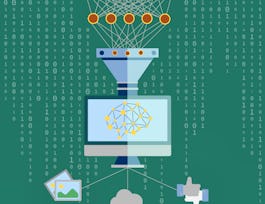This course is a complete guide to supervised and unsupervised learning using R, covering practical data science comprehensively. Companies globally use R to analyze vast data, and mastering it can enhance your career. Unlike other courses, this one provides in-depth knowledge of R's machine learning features, from data reading and cleaning to implementing and evaluating algorithms.



Clustering and Classification with Machine Learning in R

Instructor: Packt - Course Instructors
Sponsored by ITC-Infotech
Recommended experience
What you'll learn
Perform basic data pre-processing and wrangling in R Studio.
Implement and analyze unsupervised clustering techniques, such as K-means clustering.
Implement supervised learning techniques and classification methods, such as Random Forests.
Utilize dimensional reduction techniques (PCA) and feature selection.
Details to know

Add to your LinkedIn profile
11 assignments
August 2024
See how employees at top companies are mastering in-demand skills


Earn a career certificate
Add this credential to your LinkedIn profile, resume, or CV
Share it on social media and in your performance review

There are 10 modules in this course
In this module, we will introduce the course, outlining the fundamental concepts of clustering and classification in machine learning. We will also guide you through the installation and setup of R and R Studio, ensuring you are prepared to dive into the practical aspects of the course.
What's included
2 videos1 reading1 assignment
In this module, we will explore the different methods to import data into R from various sources. You will learn to read data from CSV and Excel files, unzipped folders, online CSVs, Google Sheets, HTML tables, and databases, setting the foundation for data manipulation and analysis.
What's included
7 videos1 assignment
In this module, we will delve into data cleaning and preprocessing, ensuring your data is ready for analysis. You will learn to summarize and explore data using the dplyr package and create visualizations with ggplot2. Additionally, we'll cover methods to evaluate associations between variables and test for correlation.
What's included
11 videos1 assignment
In this module, we will explore the differences between machine learning and traditional statistical analysis, providing a theoretical overview of machine learning. You will gain a foundational understanding of machine learning concepts and their relevance to data science.
What's included
2 videos1 assignment
In this module, we will cover unsupervised learning techniques, focusing on clustering algorithms. You will learn to implement and evaluate different clustering methods, including K-Means, Fuzzy K-Means, DBSCAN, and more. We'll also discuss how to select the best algorithm for your specific data needs.
What's included
12 videos1 assignment
In this module, we will explore techniques for reducing the dimensionality of your data. You will learn the theoretical aspects of dimension reduction and how to apply methods such as PCA, Multidimensional Scaling, and SVD in R to simplify your datasets while preserving essential information.
What's included
5 videos1 assignment
In this module, we will focus on feature selection techniques to identify the most relevant predictors for your models. You will learn to remove correlated variables and use methods like LASSO regression, FSelector, and Boruta analysis to select important features, enhancing your model's performance.
What's included
4 videos1 assignment
In this module, we will introduce the fundamental concepts of supervised learning. You will learn how to preprocess data for supervised learning and gain insights into various types of supervised learning problems, preparing you for more advanced classification and regression techniques.
What's included
2 videos1 assignment
In this module, we will delve into classification techniques in supervised learning. You will learn to implement logistic regression, Decision Trees, Random Forests, and Support Vector Machines (SVM). We will also cover methods to evaluate classification accuracy and understand variable importance in your models.
What's included
18 videos1 assignment
In this module, we will provide additional lectures focusing on advanced clustering methods. You will learn about Fuzzy C-Means Clustering, understanding its theoretical underpinnings and practical applications in R, further enhancing your clustering analysis skills.
What's included
1 video2 assignments
Instructor

Offered by
Why people choose Coursera for their career




Recommended if you're interested in Data Science

Sungkyunkwan University

Coursera Project Network

Duke University

Open new doors with Coursera Plus
Unlimited access to 10,000+ world-class courses, hands-on projects, and job-ready certificate programs - all included in your subscription
Advance your career with an online degree
Earn a degree from world-class universities - 100% online
Join over 3,400 global companies that choose Coursera for Business
Upskill your employees to excel in the digital economy



